PREVIOUS
Mohandas Karamchand Gandhi - II
May 11 , 2019
2174 days
12117
0
Non-Cooperation Movement
- In February 1919 Gandhi founded the Satyagraha Sabha at Bombay to protest against the Rowlett Act.
- Gandhi was elected president of the First All-India Khilafat Conference at Delhi on November 23, 1919.
- After the death of Bal Gangadhar Tilak on August, 1920, Gandhi became virtually the sole navigator of the ship of the congress.
- Non-cooperation Movement was one of Gandhi’s most important movements against the British which is coincided with Khilafat Movement during 1920s.
- In May 1921, there was a talk between Gandhi and Reading the then Viceroy.
- In November 1921, the Prince of Wales Edward VIII was shown Black Flag by the people on the advice given by Gandhi during the Non-Cooperation Movement.
- But the violent clash in Chauri Chaura town of Uttar Pradesh on 05 February 1922 led to the end of movement.
- On 12 February 1922, the Congress leaders met at Bardoli and Gandhi decided to withdraw the Non-cooperation movement through Bardoli resolution.
- Gandhi was arrested on 10th March 1922 under Section 124-A in the Indian Penal Code and was tried for sedition.
- He was sentenced to six years imprisonment, but served only two years in prison.
- Gandhiji was the president of the Congress only on one occasion and the session was held in Belgaum on 1924.
- Gandhi passed a resolution at the Calcutta Congress in December 1928, calling on the British to grant India dominion status.
Salt Satyagraha
- Gandhi started the Dandi March with his followers in 1930 against salt tax.
- The march begins on 12 March 1930 at Sabarmati Ashram near Ahmedabad and end on 6 April 1930 at Dandi.
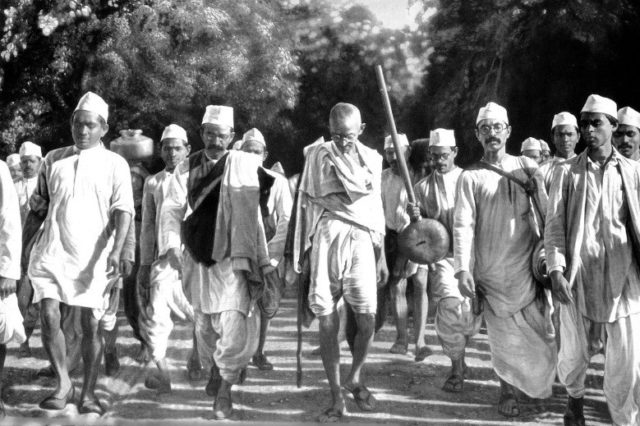
- The protest was successful and resulted in the Gandhi-Irwin Pact on 05 March 1931.
- Post the Gandhi-Irwin Pact, Gandhi was invited to round table conferences by the British.
- Bhagat singh, Raj Guru and Sukh Dev were hanged on 23 March 1931 in the Lahore jail.
- karachi session (1931) has been organized under the leadership of sardar Patel in karachi.
- Gandhi was greeted with hostile slogans and black flags when he went to attend the Karachi session of the Congress on march 29.
- He was blamed for not making bhagat sing and his friends’ commutation of the sentence as a condition for settlement in the Gandhi-Irwin pact.
- The Second Round Conference was opened on September 7, 1931.
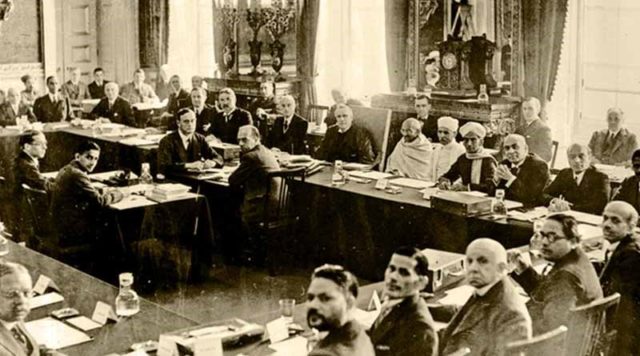
- Gandhi represented Indian National Congress and Sarojini Naidu represented Indian women.
- Winston Churchill made a statement about Gandhi as “Half Naked Seditious Fakir”.
- After learning about the true intentions of the British during the second conference, he came up with another Satyagraha, for which he was once again arrested and put at Pune Yerawada Jail.
Poona Pact
- After the Second Round Table Conference, the British Prime Minister Ramsay McDonald announced Communal Award on 16th August 1932 granting separate electorates to untouchables.
- It was continuously demanded by Dr. Ambedkar who had participated all the Three Round Table Conferences.
- Poona Pact was made between Ambedkar and Gandhi signed on September 24, 1932 against communal award in Yerawada Jail, Poona.
- These days Gandhi coined and popularized the term Harijan.
- Gandhi founded “All India Anti Untouchability League” in Septemper,1932 to remove untouchability in the society.
- It was renamed as Harijan Sevak Sangh ("Servants of Untouchables Society") in November 1933.
- Gandhi started publishing a weekly journal called "Harijan" on 11 February 1933 from Yerwada Jail.
- He created three publications: Harijan in English (from 1933 to 1948), Harijan Bandu in Gujarati, and Harijan Sevak in Hindi.
- In 1934 He established the "All India Village Industries Association" at Wardha in Maharashtra.
- He made a statement as “The future of India lies in its villages”.
- In 1934 Gandhi resigned from Congress party membership and Gandhi returned to active politics again in 1936.
- After the 1935 Government of India Act, there was debate between Gandhi and Nehru over the participation of the Congress into the elections. This was known as S-T-S (Struggle-Truce-Struggle held by Gandhi) and S-V (Struggle-Victory held by Nehru) strategical debate.
- In April 1936, Gandhi established his residence in a village called Segaon at the outskirts of Wardha which he renamed as Sevagram (village of service).
- In 1939, Subhash Chandra Bose was re-elected the President of INC at the Tripuri Session in 1939 by defeating the Gandhi’s Candidate Pattabhai Sitaramaiyya.
Final stage
- After the starting of Second World War, British Viceroy Linlithgow offered August Offer to secure the Indian support into the War in August 1940.
- To protest against August Offer Gandhi insisted to start Individual Satyagraha, also known as Delhi Chalo Movement, to encourage the right of speech in September 1940.
- The Cripps Mission was a failed attempt in March 1942 by the British to secure Indian cooperation and support for their efforts in World War II.
- Gandhi said that Cripps' offer was a "post-dated cheque drawn on a failing bank"
- During the second world war the 'Quit India Movement' or the 'Bharat Chhodo Andolan' was launched by the INC under the leadership of Mahatma Gandhi in 08 August 1942.
- On that occasion only he made a call to Do or Die at the Gowalia Tank park in Bombay.
- In 1942, Gandhi, his wife and other freedom fighters were imprisoned in the Aga Khan Palace in Pune.
- Mahadev Desai, the personal assistant of Gandhi, died of a heart attack on 15th August 1942 at the Aga Khan Palace.
- On 22 February 1944, kasturiba died at the Aga Khan Palace itself due to severe ill-health.
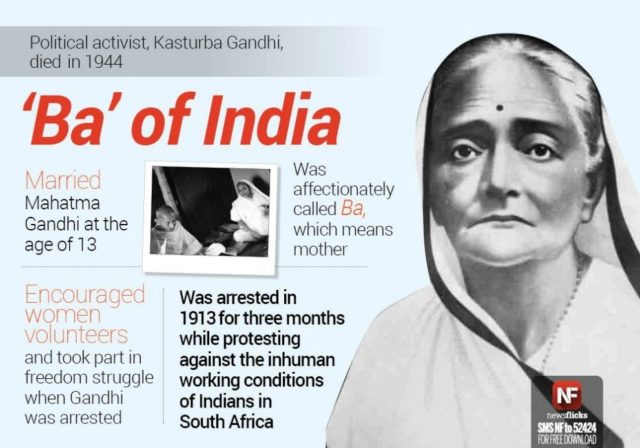
- On 6 July 1944, Subhash Chandra Bose addressed Gandhi as "The Father of the Nation in Singapore radio.
- The independence cum partition proposal offered by the Mountbatten Plan in June 1947, also known as June 3rd Plan, was accepted by the Congress, despite being advised otherwise by Gandhi.
- In this time, Lord Mountbatten called Gandhi as a “one-man army”.
- From 13 August 1947 onwards, Gandhi began efforts to personally pacify people from either community and urge them to end the violence in Noakhali, Calcutta.
- On August 15,1947, India became free and independent.
In Memories
- Gandhi defeated the mighty British empire by means of strange and utterly new weapons of truth and Ahimsa.
- During the time of 1940s Gandhi named Pandit Nehru as his political heir and successor.
- The inspiring life of Gandhi came to an end on 30thJanuary 1948, when he was shot by a Nathuram Godse in the compound of Birla House in Delhi.
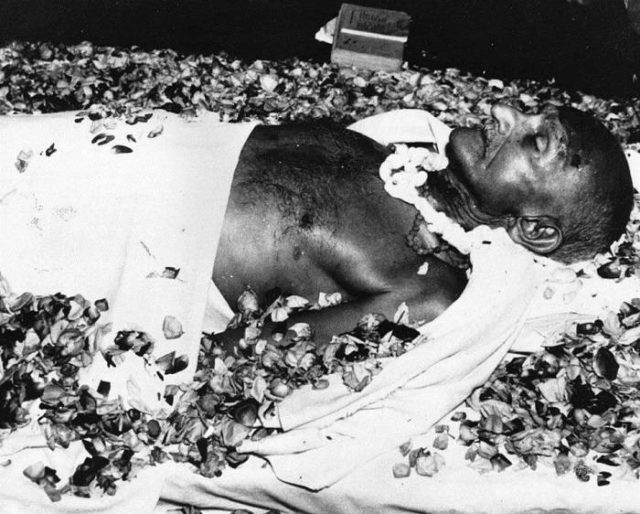
- The Birla House site where Gandhi was assassinated is now a memorial called Gandhi Smriti in Delhi.
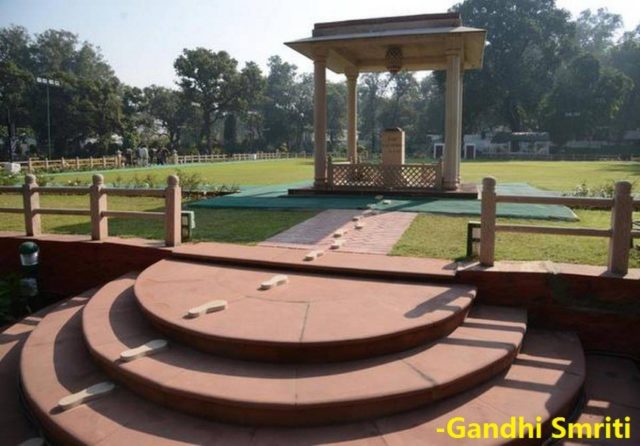
- The place near Yamuna river where he was cremated is the Rāj Ghāt memorial in New Delhi.

- Beginning in 1937, Gandhi was nominated for the Nobel award five times.
- But His final nomination came just weeks after his assassination in January 1948.
- At that point in its history, the Nobel Committee had never awarded a prize posthumously.
- So, unwilling to bestow the award posthumously, yet recognizing Gandhi’s lifelong commitment to non-violence, they instead decided not to award that year’s (1948) peace prize to anyone.
- On 15 June 2007 the United Nations General Assembly established 2 October as the International Day of Non-Violence.

Literary works and policies
- Gandhi wrote a book titled Hind Swaraj or Indian Home Rule in 1909.
- The Story of “My Experiments with Truth” is the autobiography of Gandhi, covering his life from early childhood through to 1921.
- Gandhi said "Sanitation is more important than independence".
- He made cleanliness and sanitation an integral part of the Gandhian way of living.
- This is why the Swachh Bharat Abhiyan is being carried out to highlight the legacy of Gandhi on his 150th Birth Anniversary.
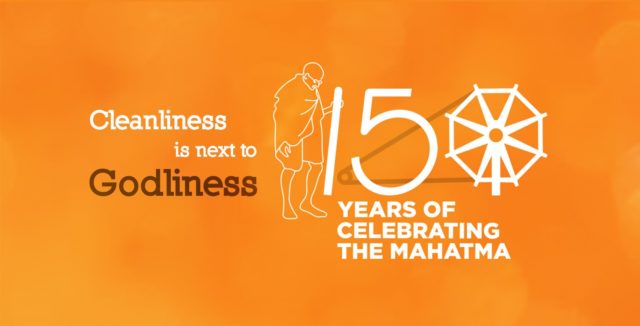
- There are 6 major principles that Gandhi followed during his life time:
- Truth: learning from your own mistakes and conducting experiments on yourself.
- Nonviolence: nonviolent resistance connected in a way to religion.
- Vegetarianism: carved in the Hindu and Jain traditions in India.
- Brahmacharya: spiritual and practical purity.
- Simplicity: giving up unnecessary spending.
- Faith: belief in a Higher power and that all religions are real and are equal.
- - - - - - - - - - - - - - - - -
Leave a Reply
Your Comment is awaiting moderation.


